March 29, 2018

What is it like to be raised among bulk bins and milk crates as your pioneering parents build a health-food store from scratch? How does it feel to take over that business as an adult with the goal of keeping their legacy alive? From childhood “jobs” to junk-food rebellions to the self-inflicted pressures of not letting Mom and Dad down, these second-generation natural products store owners have experienced it all.
Marieke Cormier
Second-generation owner of Roots Natural Foods in Leominster, Massachusetts
What was your ear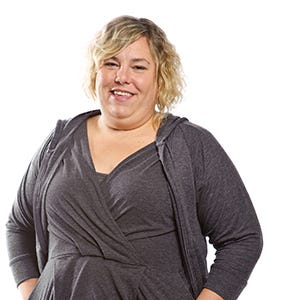 liest exposure to the store?
liest exposure to the store?
MC: Before they started Roots in 2002, my parents opened one of the first natural food stores in our area in the late ’70s. I was practically raised in a backpack in that store.
Were you encouraged to go out and explore the world?
MC: Yes. I went to the University of Alaska and studied biology. I love to travel and definitely spent lots of time away before returning to my hometown 11 years ago. That was much needed to bring new life and energy to the store. Although I’d always planned on taking over the business, it happened earlier than expected because of my mother falling ill to cancer in 2011. I inherited 100 percent of the business after she passed in 2012.
What was it like when you realized this would be your career?
MC: I was excited. I love being my own boss and having the ability to offer the community a unique place to eat and shop. I love that owning a natural foods store has endless possibilities and never gets dull. And I love being the person who decides the next steps and creates our vision for the future. My staff calls me “the captain.” So yeah, it was a pretty natural path for me. It also lets me continue the legacy of what my mom created.
How have you put your stamp on the business?
MC: I’ve opened an organic juice bar and fast-casual restaurant in the store in the past three years. We’ve gone from nine to 26 employees. I also joined INFRA, which has tremendously changed the way we operate.
Is it difficult to separate work life from family life?
MC: When my mom was alive, they were very intertwined. Every day off was a work day just because we loved Roots so much and wanted to improve the way we did business. I try harder these days to make a separation, but it’s difficult.
Why is it important to keep Roots going?
MC: This business was gifted to me, and while I’ve put my stamp on it, I also feel like it keeps the spirit of my mother alive. Even though she is not with us, I always want to make her proud!
Abraham Nabors
Second-generation owner and director of education and standards at Mustard Seed & Café in Akron and Solon, Ohio
Did your paren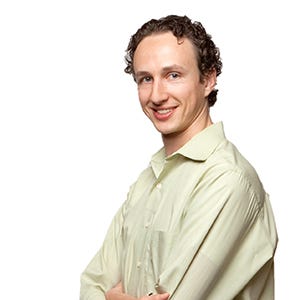 ts put you to work as a kid?
ts put you to work as a kid?
AN: My dad would pay me a nickel to wash a small window, a dime for a bigger window and a quarter for a deli case. My first real job, at age 12, was catering for 12 hours at a huge rock-and-roll festival. One employee didn’t show, so my mom asked sheepishly if I’d wash dishes and bus tables.
I had a blast. The woman in charge asked my mom, “Can we keep him?” I was like, “Say yes! Say yes!”
Did you always intend to take over the business—or were you opposed to the idea?
AN: Honestly, it was a bit of both. Ever since I was about 5 years old, I knew I liked Mustard Seed and wanted to keep being a part of it. When your mom and dad are doing cool things, you’re their No. 1 fan. But my parents encouraged us to go to college and explore our own paths. I got a degree in environmental geography and plant biology, but it was pretty much only fracking companies that wanted to hire people with those degrees—that was obviously not what I wanted. So when school was almost over, I told my mom I was coming back. She started freaking out and crying. It was adorable.
When did you become an actual owner?
AN: I think I’ve always been an owner. We have private stock, and my parents are majority shareholders. I don’t even know to what degree my brother and I are shareholders. We’ll worry about those details later—we’re just trying to grow the business.
Are your parents still involved with Mustard Seed?
AN: Mom is fully retired. Dad is semi-retired. He does high-level business meetings, but he’s not involved with the day-to-day.
How did the transition occur?
AN: We hired a consultant to do a 360-degree analysis of our administration and management team. After looking at the professional assessment, we decided together what the best structure would be going forward to make sure there was an intentional way to go about succession planning. That’s partly why we hired Jon Fiume as our chief operating officer. My brother and I told my dad that we weren’t trying to run the company by ourselves right now, but we wanted a seat at the table. And we needed a mentor who wasn’t him or Mom. Jon has held that gap between the first and second generation being the top dog every day.
What changes have you implemented?
AN: My brother and I have put our stamp on Mustard Seed in many, many ways. If you don’t evolve rapidly to keep up with technology, you’ll be left in the dust. You have to double down on growth strategies and be nimble in the marketplace. We are using technology in how we buy, where it’s less pencil and paper and more spreadsheets. We are running the business with a strategic planning process so we have more global coordination around an agreed-upon strategy.
Is it difficult to separate work life from family life?
AN: They’ve always been blended. It was common for family dinners to turn into de facto board meetings lasting until 11 p.m. I’m very thankful our parents raised us in a very open and inclusive environment. But it’s not always about business. We also have a strong family relationship and are never really in conflict. My brother and I have been roommates for six years, so we live and work together and haven’t ripped each other’s hair out. I feel very fortunate because many people don’t even have the family part down, let alone being roommates, let alone business partners.
Of course you want Mustard Seed to succeed. But do you feel added pressure to not let your folks down?
AN: Absolutely. We know we have very big shoes to fill. No one ever wants to do a bad job or let their parents down, especially if you’re the next generation trying to keep something going. The research on the success of second-generation businesses isn’t very optimistic. But we hope we are standing on their shoulders and have a head start because of what we learned from them so young.
Do you ever consult with other second-generation owners?
AN: It’s really nice to know we have kindred spirits. We aren’t located near each other so we’re not direct competitors. We are absolutely rooting each other on because we have the same corporate big-money threats to worry about. It’s about family independents sticking together and fighting the big battles. Last year’s Expo East brought more of us together than I knew were out there. That was really cool.
Gabriel Nabors
Second-generation owner and director of category management and marketing at Mustard Seed & Café in Akron and Solon, Ohio
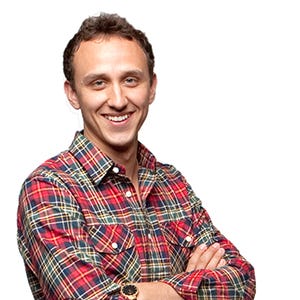 When did you start working at Mustard Seed?
When did you start working at Mustard Seed?
GN: As an incentive to work weekends in eighth grade, Mom would take me to this little café. She started Mustard Seed because she believes in clean eating, yet once a week she’d say, “If you come to work with me, you can have a bagel full of preservatives.”
Did you plan on following in your parents’ and brother’s footsteps?
GN: Funny enough, I was a senior in college, a finance major, and my number-one criteria for any job was “not in Ohio.” I got a good offer from a bank in North Carolina, and Dad was kind of shocked I wanted to move. He said, “Whoa, you’re not going to work for us? Your brother is here.” I said, “I know. But it’s your business, not mine. And Dad, you never offered me a job.” He said, “Well, let’s figure it out; I want you to join the business.” That was eight years ago, and I haven’t gone anywhere.
What keeps you there?
GN: I really believe in what we do and the mission my parents set forth in 1981. I like to think we’ve only gotten better at fulfilling that mission, from upgrading our standards to forging local partnerships to mitigating our carbon footprint to being not just a grocery store. It’s really fun to touch different customers in different ways.
How have you made your mark on the business?
GN: We didn’t really have a marketing department, and as a finance major, I started asking why we were spending dollars certain ways. So I volunteered myself to explore new options. Before, when we had just two stores, we kind of let managers do their thing. But with three, we had to change how we looked at things like pricing decisions. We began using data for category management to have more solid structure and poise ourselves for growth. This was a big step, and I was a big part of creating that system.
Is it hard, even scary, to change up longtime business operations?
GN: Just because we’ve been doing this a long time doesn’t mean we’ve been doing it the right way. It’s OK to ask questions. I always say, fail fast, fail cheap. Test a new idea in one area instead of going big with every idea you think will work. But when we were making all those big changes, Mom would joke, “Now, don’t screw up my retirement.”
What does it take to make a second-generation business thrive?
GN: Second-generation businesses often fail because there is a lot of passion and power in starting a business from scratch, and it’s difficult to carry on that fire. So it primarily comes down to passion, but also people. Just because they are my parents, doesn’t mean I’m the same as them. I’m very different from them; I’m different from my brother. You have to look past an owner’s skills, talents and personality and focus on the future, asking where is the business going?
What will it take to keep Mustard Seed rocking in today’s rapidly changing retail landscape?
GN: We know a lot of business is going to the internet. So to deal with that, we want to double down on experience and fresh, showcase our relationships with farmers and do more tastings and classes. When you add all these elements together, it doesn’t matter what corporation comes in to compete—they can’t replicate that. People want community, which is why we’ll succeed. We might have to change some things and bring in revenue from different areas, but we will continue to adapt.
Rory Eames
President and second-generation owner of Organic Market, a three-store independent in Cape Cod, Massachusetts
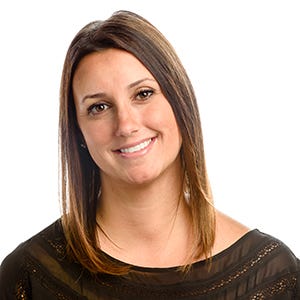 What was your earliest exposure to the store?
What was your earliest exposure to the store?
RE: My mom and aunt founded Organic Market in 1978, before I was born, so I grew up coming to the store and hanging out with them. I’ve been a retail kid for as long as I can remember.
What did you make of all the healthy food back then?
RE: I was so mad! Why did I have to have chard and rice and beans in my lunch box? I’d say, “Can I trade you this lentil loaf for your Cheetos?” And the kids would be like, “Are you crazy?!” My stepdad used to sneak me to Wendy’s for fries and a Coke.
Did your mom put you to work as a kid?
RE: Oh, for sure. I knew how to ring a register by age 5. Then I’d work in the summers throughout high school.
When did you become an official owner?
RE: When I was 21. That’s when I came back to the business on a full-time, serious level. I went to college briefly and just took some time to figure out what I wanted to do. I decided I liked working for myself and with my family more than I liked working for someone else.
Did you assume roles bit by bit or dive in all at once?
RE: Just kind of piece by piece. I’m very fortunate that my mom really took my position in the company seriously from day one. I obviously had to prove myself, but since I grew up in the business and kind of knew how things worked, it was a nice partnership. We opened a third store in 2014—definitely a big undertaking. It was fun and challenging, a great experience to have with my mother. It was very special to be able to open a store together.
Is your mom still involved in the business today?
RE: Yes, she is very influential in the way we operate. She has a big part in any new initiatives. And with any major decisions, it’s a collective effort. She’s in Florida for the winter but will come back for a few meetings, and we’ll email her questions. I definitely scramble to put everything back together before she returns in spring.
It sounds like you two have a good working relationship. Any friction?
RE: I’m very close with my mom, even though we drive each other crazy sometimes. I’m more anxious by nature while she is calmer—which is good. I feel like because she’s been doing this for so long, she knows that if you work hard and do the right thing, all of the pieces will fall together. So we are definitely nice complements to each other. I’m an only child so it’s been she and I for many years. And now I have a 10-year-old daughter growing up in this business.
Why is it important to keep your family-owned independent thriving?
RE: We play an important role in the three communities we’re in. A big part of that is because my mom started this business so long ago and she has so much respect from the communities. She started our awesome culture, so I give her all the credit for taking a leap of faith in 1978. There is a big comfort level in our stores, whether you are ordering a nutritious lunch that you know will make you feel good or you need help picking out vitamin C because someone in your family is sick. We definitely create an experience, from our amazing staff to our unique product mix. Our pricing is good and our service is better than anywhere else. We have fun and the communities have fun.
Emily Kanter
Second-generation co-owner of Cambridge Naturals in Cambridge, Massachusetts
What is your 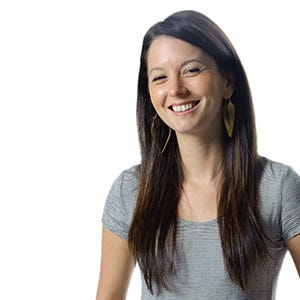 earliest memory of your parents’ store?
earliest memory of your parents’ store?
EK: Being plopped into an old milk crate in the middle of the store as a baby and just watching the day go by. Then I’d come in after school every few days, and it was like my playground. I was close with the staff and they’d play games with me. Later on, I’d answer phones, ring at the registers and stock shelves.
Did you buy into your folks’ healthy living philosophies back then?
EK: I was the only kid in elementary school with sprouted bread and almond butter, so nobody wanted to trade with me—that was pretty rough! I loved the store and many of the products, but I didn’t show that off to my friends. In high school and college, I tried to be my own person. I ate junk food and went to CVS to buy Herbal Essences shampoos. Eventually, I started trying more natural products on my own, discovering for myself what was in them and really liking them.
When did your passion for this industry really develop?
EK: I became more passionate about the work we do after reading The Omnivore’s Dilemma. I started to connect the dots between what my parents had been doing for decades and what Michael Pollan wrote about the industrialized food system. And while living in South America and East Asia after college, I saw how Western globalization had affected the local diets. I became passionate about local food systems and worked in nonprofits supporting them, and then I went back to business school. Simultaneously, my parents started talking about transitioning out of the business after 40 years.
Were you eager to jump on board?
EK: My husband, Caleb, and I were living in Portland, Oregon, at the time and started discussing what it would look like if we took over the business. The more we talked, the more excited we got, so we decided to move back in 2014.
How did the staff respond to you coming back?
EK: For some, I think it was confusing. Some had known me for years and were either excited to see me back or wondering what it was going to mean. We tried to not give too much indication of where we were going because Caleb and I needed to settle in and figure out if we wanted to stick around and do this. So I came in trying to learn from scratch and acted like I hadn’t grown up in the business. Most of the staff embraced me, and now I think we have the best team we’ve ever had.
Are your parents still involved in the business?
EK: My mom is still heavily involved in financial aspects and HR. My father is chief visionary officer so he’s involved in big-picture discussions about the business. He also comes in every few days to take out the trash, front shelves and do customer service. They both mentor Caleb and me in our decision-making.
Do they have an exit strategy?
EK: Nothing formal at this point. Sometimes this is an area of contention, but more often than not, we’re all on the same page about where we’re going. They’ve started transitioning parts of their roles to us, and we’ve gone over what we envision the transition will look like.
Do you feel added pressure to not let your folks down?
EK: Oh my gosh, of course. This is a huge part of my parents’ legacy, and I want it to thrive for us and our team, obviously, but especially for my parents. They were way ahead of their time and are just now getting credit for what they worked so hard to create, so it is very important to me to keep their legacy alive. But I know they trust me and don’t want me to succumb to so much stress that I’m not loving what I do. I feel pressure, but not from them. It’s all coming from me.
What will make Cambridge Naturals succeed in today’s very different retail landscape?
EK: Shopping online is really fun, but I honestly think most people don’t get the same satisfaction as shopping in a wonderful brick-and-mortar. Not all brick-and-mortars are created equal—some can be really painful—but we try to create a truly wonderful shopping experience. We engage with customers and consider many of them friends. They can touch, taste and smell our products in real life, which they can’t do online. Also, community building is really hard to do online. Even though it’s popular wisdom that everyone wants everything delivered to their door and wants to avoid the hassles of stores, that’s not what our customers tell us. Some come in just to be in the store and around people who have the same philosophies as they do. We are all stuck in our devices, including me, but that’s just not as satisfying as having really wonderful face-to-face conversations. In order to thrive, brick-and-mortar can’t just be a transactional experience; it has to be a relationship experience.
Summer Auerbach
Second-generation owner of Rainbow Blossom Natural Food Markets & Wellness Center, a five-store independent in Louisville, Kentucky
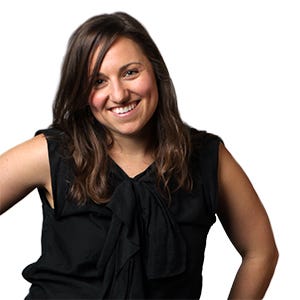 What was your earliest exposure to the store?
What was your earliest exposure to the store?
SA: The store is older than I am, so I literally grew up in the business. It’s been one of those true constants in my life. We lived on a farm outside the city, so the stores were my afterschool day care. I spent afternoons bagging groceries, then eventually checking people out, then answering questions. By the time I went to college, I’d worked in every department.
Since you took over Rainbow Blossom when your dad got cancer, you were kind of on your own. Was this tough?
SA: Our situation is so unique. I’ve been asked to speak on succession planning and I’ve said that what we did is model of what not to do! So many interesting family dynamics can get in the way of these transitions, so I think I was lucky to be able to prove myself when no one was watching. It let me build up trust in my competency.
Was there any friction with staff when you took over?
SA: I’ve ended up letting people go who babysat me. These are difficult dynamics, but ultimately we were trying to change the culture and a person needed to get on board or be gone.
Even though your parents aren’t directly involved in the business, do you ask them for advice?
SA: I’m so glad I have my dad when I need a confidant who has a different perspective. I call him for business advice because he’s always so even-headed. I call my mom more for emotional support and personnel issues. The industry has changed so much, so sometimes I tease my dad. He’ll say, “We sell so much soymilk!” And I’ll say, “Do you even know what year it is?” His perception of what we have to offer is so stuck in the past.
Do you think independent natural products stores have a bright future?
SA: A new study found that even though the narrative is that retail is losing at a big rate in this Amazon age, independents are better positioned to survive. But that story isn’t always being told. We’ve found this to be true. Since Amazon announced the Whole Foods merger, we’ve seen a spike in sales. People still like walking into a store, touching things, making impulse buys and having that retail therapy experience. But when you look at Macy’s or JC Penny, they are so big and need a certain amount of overhead. I think the smaller independents that can scale down, change their offerings and don’t need a giant footprint will probably survive.
About the Author
You May Also Like
.png?width=700&auto=webp&quality=80&disable=upscale)



